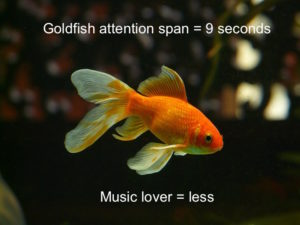- in Music , Production by Bobby Owsinski
- |
- 1 comments
How Our Short Attention Span Is Changing Song Structure
 Radio airplay has always influenced how songs were produced, chiefly the length, as for years it was felt that 3 minutes was the ideal length to keep the listener engaged. In fact, today songs are sped up routinely in order to have more plays per hour. Now a pair of new studies published in Musicae Scientiae, the Journal of the European Society for the Cognitive Sciences of Music by Leveille Gauvin has found that the audience’s short attention span coupled with the rapid rise of streaming music has influenced basic song structure, as more artists try to come to the point faster than ever.
Radio airplay has always influenced how songs were produced, chiefly the length, as for years it was felt that 3 minutes was the ideal length to keep the listener engaged. In fact, today songs are sped up routinely in order to have more plays per hour. Now a pair of new studies published in Musicae Scientiae, the Journal of the European Society for the Cognitive Sciences of Music by Leveille Gauvin has found that the audience’s short attention span coupled with the rapid rise of streaming music has influenced basic song structure, as more artists try to come to the point faster than ever.
For instance, in the past it was normal for the intro of a song to last 20 or more seconds. The study offered an example of the Starship’s 1987 hit “Nothing’s Gonna Stop Us Now,” which takes 22 seconds for the vocals to begin and more than a minute to get to the chorus. As an example of a song with a more modern shortened structure, the study cites Maroon 5‘s 2015 hit “Sugar,” with the vocal entering after only seven seconds.
Part of this has to do with the fact that a different 2014 study of Spotify listening habits found that 21 percent of songs get skipped over in the first five seconds, and producers are more keenly aware of the attention span of their listeners than ever before.
We live in an instant economy today where anything digital is at our fingertips in seconds. Regardless of the age group, if you use a computer you want your info, songs, videos, etc. dished up fast, so it should be no surprise that entertainment caters to that new way of consuming. There is beauty in a finely crafted intro, but for many years it came to be more of a tacked on necessity that was more part of “the way things are done” than what was required to make a song great. There’s nothing wrong with getting to the point quickly if it makes the song better, as long as that too doesn’t become “the way things are done.”

